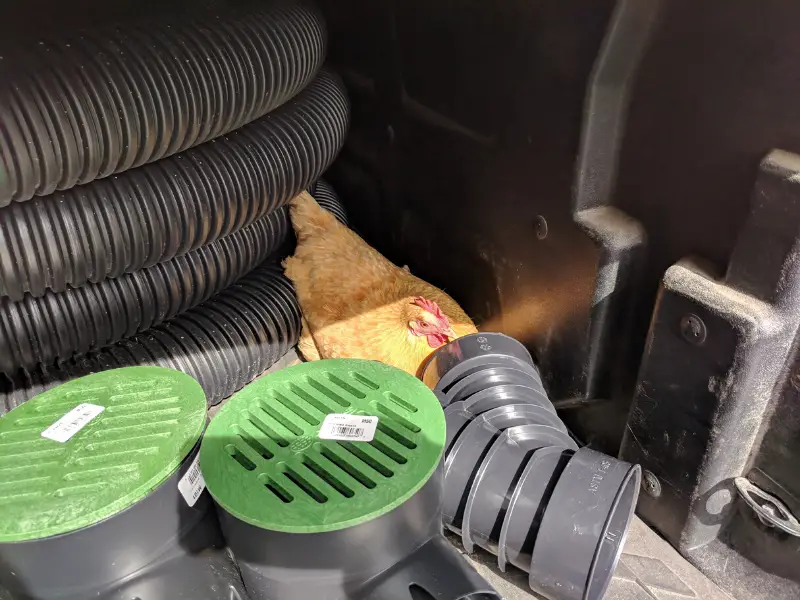A lot of people dream of owning their own chickens. The thought of frying up some fresh eggs in the morning is enough to leave their mouths watering. But when you start to notice your chickens attacking each other, you quickly realize that it’s no longer just fun, games, and scrambled eggs. Chickens can be feisty- but it’s important to know why so you can fix it.
Why do chickens attack each other? There are essentially six major reasons why chickens attack each other, including:
- They are stressed
- The chickens are bored
- The chickens are living in bad conditions
- They’re sick
- They are scared
- They see or smell blood
If you think this is a long list, we have some good news—there are simple solutions to fix most of these problems. We’re going to discuss the six major reasons why chickens might start attacking one another and how you can put an end to it before it gets out of hand.
The 6 Reasons Chickens Attack Each Other: Problems and Solutions
Bullying might not be something that everyone assumes is going to happen in their chicken coop. After all, they are supposed to be furry little friends that sit back, relax, and pop out eggs all day, right? Well, while chickens can be a great food source, they are known to be feisty, especially with other chickens.
The first thing you need to do is decide whether the chickens are truly bullying each other or if they are simply engaging in their natural pecking order. Let’s take a closer look at what exactly the pecking order is.
What is a “Pecking Order”?
Chickens have a social structure strongly based on dominance. Much like other packs in the wild, they try to declare dominance over the other chickens. In order to become the “top bird,” chickens establish a pecking order of rankings among the flock. The ranking can be determined by a variety of things, including the age, personality, and ambition of the chicken.
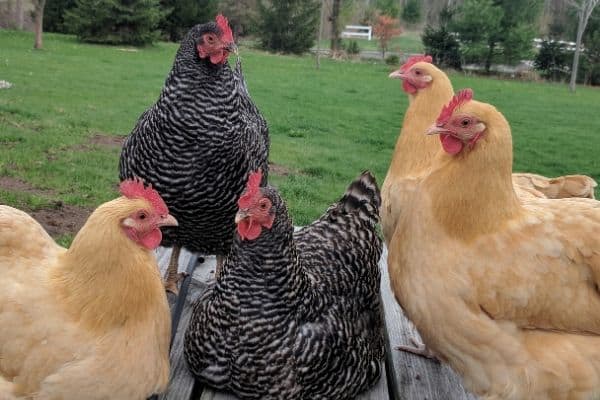
When a hen wants to assert herself in the pecking order, they will begin to demand dominance over the others. She might start picking on the other chickens to show that she is, indeed, the top bird. This can happen at any time, but it’s most likely to occur when a new chicken joins the coop.
When you first notice your chickens fighting, you might be quick to assume they are bullying each other, and you need to fix it right away. However, the major difference between the pecking order and actual bullying is that the pecking order is usually over quickly, while bullying will be ongoing.
The purpose of the pecking order is to gain a higher rank in the chicken coop. Once the chicken is satisfied in her position, the coop should go back to being fairly relaxed most of the time. If you notice the bullying continue for an extended period of time, or there has been bloodshed, then you’re likely dealing with a situation that requires your intervention.
Reasons for Bullying and How to Fix It
They are Stressed
Chickens are creatures of habit, and they do not like changes to their routine. Even minor switch-ups can cause your chickens to become unhappy. While they might start off being quiet and not laying as many eggs, they can quickly become revved up with aggression due to the changes. It could be only one chicken who becomes aggressive or all of them.
Some of the major causes of stress in chickens include:
- There is not enough light or too much light
- Their environment is too cold or windy
- There is not enough ventilation in their chicken coop
- Not enough food is available, or the food is a different type
- The chickens are becoming sexually mature
- The chickens are being transported to a new area
- There are too many chickens for the space
- They are scared of other animals or people around.
- Some type of infection, mold, or other disease is spreading through the chicken or coop.
- A new chicken joined the flock
- A chicken is injured or has died
The Solution: The best way to make sure that the chickens are not stressed due to any of these factors is to make sure that they are living in good conditions and try to stick to a routine as much as possible. Remember that chickens prefer to eat the same feed day in and day out, and they enjoy a decent amount of light throughout the day. (source)
The Chickens are Bored
It’s safe to say that a lot of creatures, even sometimes humans, can start to get aggressive when they are bored- chickens included. You are most likely to see this type of bullying behavior during the wintertime when chickens become the most bored. Kinda like Cabin Fever or should I say “Coop Fever”?
This is because chickens aren’t fond of cold and wet weather, so they will tend to stay inside for extended periods of time in hiding. As the time spent huddled together grows longer and longer, the chickens become anxious and bored and may start to bully each other to relieve their boredom.
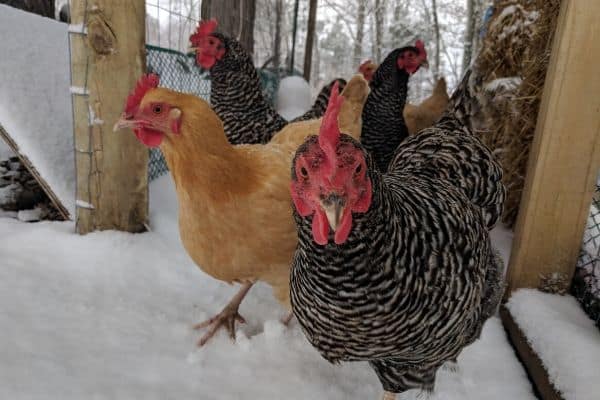
Now, most of the time boredom will only cause a little bit of feather picking amongst the chickens- and this is okay. However, sometimes chickens can become extremely aggressive and gang up on a smaller, timid chicken. They can even keep the poor chicken from reaching their food and water.
The Solution: You guessed it–the best solution to stopping wintertime bullying is to make sure that your chickens don’t get bored in the first place. Here are a few great ideas to bust boredom during the winter months and keep your chickens from attacking one another:
- Build them an outdoor roost. Chickens love to look at the world around them. Since they don’t want to get their feet wet on the cold grounds, this is a great way for them to escape the chilly ground and get up on top. This will keep them occupied for a long period of time and keep them thrilled and happy.
- Put together a pile of leaves or dirt. You can toss together a bunch of materials- such as leaves, dirt, and pine needles- into a big pile. Chickens can’t stand the sight of piles, and they will have a grand ole time kicking and scratching until the heap is settled again.
- Hang a mirror or two in the coop. Is the chicken a stuck-up bird? Maybe. But whether she’s an arrogant bird or not, there is one thing known to be true: chickens love to look at themselves. Hang up a few mirrors around the coop, and you’ll have happy chickens year-round.
- Let them roam free. Even if it’s really cold during the winter months, it’s important to buckle down and make sure that your chickens are able to escape the coop for a while. Even though they don’t necessarily love to be in a cold and wet environment, they will love the chance to roam free for a bit and get some exercise in.
The Chickens are Living in Bad Conditions
The number one cause of chickens bullying one another are bad living conditions. After all, who wants to live somewhere they are uncomfortable? It’s a recipe for disaster that leads to the chickens turning on each other in an attempt to get rid of their pent-up rage. There are a few different things that are considered “bad living conditions,” including:
- Overcrowding. Perhaps the biggest reason why chickens will turn on one another is that there are simply too many chickens in the coop. No chicken wants to spend their entire day in a small area with an overload of other chickens. There isn’t enough room to relax and walk around, which means they are likely to get fed up. Aside from that, more chickens increase the pecking order, which can lead to fighting for dominance.
- The chicken coop is too small. This goes hand-in-hand with overcrowding to a certain degree. But keep in mind that even though you may only have a few chickens, that doesn’t mean they will be happy in a tinier living space. The goal is to always make sure they have plenty of room to roam and be happy.
- There is only one eating and drinking station. When there is only one option, the chickens may end up fighting over it. In fact, when bullying occurs, a group of chickens in the coop may stop a cowardly chicken from reaching the feeding dish altogether.
- The lighting isn’t right. Leaving a light on in the coop all night long is sure to stress them out. Some homesteaders use artificial lighting to encourage egg-laying through the winter but be sure the total time on is 12 hours or less. On our homestead we don’t force lay which causes the egg-laying to taper off in the winter but we feel it’s less stressful for the hens overall.
- It’s too cold and wet without proper ventilation. Sometimes you can’t help the weather, but placing fresh bedding on the ground will help the floor from becoming too cold and ensuring there is proper ventilation will help during the cold and warmer months.
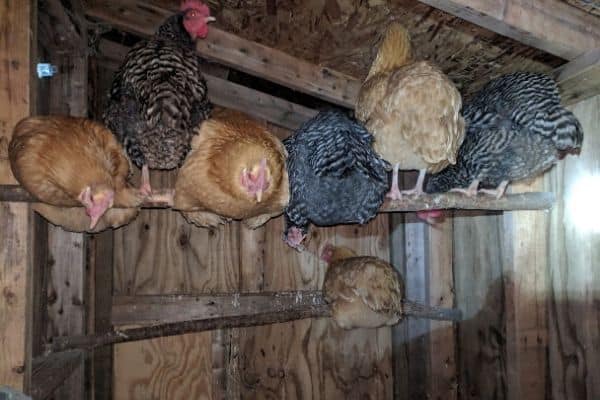
The Solution: Make sure that your chickens are living in an environment they are happy with. The biggest thing to consider is overcrowding. Don’t get too many chickens right off the bat, and always make sure that you have enough room to accommodate every chicken. Apply more than one eating and drinking station and ensure they are getting enough ventilation.
They’re Sick
Chickens can tell when another chicken in their coop is sick. It’s a natural ability that, when in the wild, makes the rest of the chickens turn on the individual and force him/her away from the flock. This is done to reduce the spread of the illness within the chicken coop. However, it’s a natural instinct that followed the chicken into domestic life.
When a chicken becomes ill, the rest of the pack will begin to pluck her feathers and essentially bully her until she runs away. If you’re not sure whether your chicken is sick or not, look out for these signs:
- Loss of appetite
- Sudden weight loss
- Lethargy
- Hiding from the rest of the pack
- Difficulty walking
- Dullness in the eyes
- Not laying any eggs
- Losing feathers or fluffed-up feathers
- Any other behavior which is abnormal for your chicken
The Solution: If you think that your chicken is sick, the best thing to do is to check with or visit a veterinarian right away. You can also do the following to help your chicken feel better and also keep other chickens from becoming ill:
- Keep the chicken away from other chickens. You want to isolate the chicken so that it doesn’t spread to the rest of the coop.
- Make sure the chicken is well-hydrated. Water is extremely important when your chicken is ill. Make sure their water is stocked up. Consider adding a small teaspoon of apple cider vinegar to the water to speed up the healing process.
- Make sure she is eating, too. If she isn’t eating her regular food, you can always give her a treat instead. You may also consider adding garlic to the food as this is an antimicrobial and helps with sickness.
- Feed her a little bit of yogurt. Yogurt is jam-packed with pro-biotics, which are great for your chicken’s health. Don’t overdo it as too much yogurt will cause diarrhea.
They are Scared
By now you are well aware that chickens don’t mind throwing the weakest link “under the bus.” Well, the same is true when the chickens are feeling threatened by an outside source, too, such as a large animal nearby or perhaps even a rambunctious child that’s keeping them alarmed.
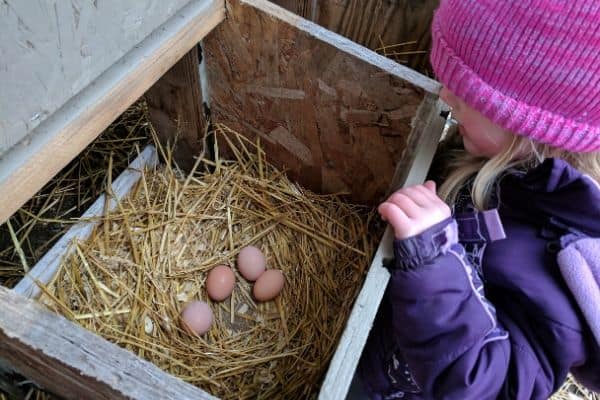
When your chickens are scared about a nearby predator, their first instinct is to fight amongst each other to find the weakest link. This weaker bird will then be used as a shield to keep the other chickens safe.
The Solution: The best way to solve the issue of scared chickens is to always make sure that they are in a safe place. There are a couple of ways to make sure they feel safe and secure, out of harm’s way:
- Make sure they are in a sturdy coop. This coop should feel durable so that the birds feel confident resting in it. Also, a good latch on the coop will keep any of the chickens from wandering out into the wild when you don’t want them out.
- Keep roosters separate. Multiple roosters can be even more vicious than hens. While a rooster can sometimes be utilized to get the pecking order in line, they can end up doing far more damage than good. It’s best to keep the roosters and chickens away as much as possible. Usually keeping one rooster with a flock of hens is best practice. The rooster will take on the job of protector of the flock.
- Construct a chicken wire fence that’s at least six feet high. This type of shielding around the coop will ensure that no unwanted predators make their way inside. Make sure that the wire fence is secured by placing it six inches deep into the soil, or folded over and buried a foot or two out from the pen. This deters predators from digging under the fence. Check out this YouTube playlist dealing with chicken predators.
- Add a motion sensor light to the coop. The motion sensor light will scare off any potential intruders that can cause harm to your chickens, such as foxes or raccoons.
- Gather the eggs and clean the food daily. Eggs that are left sitting out, as well as leftover food, can be tempting for predators. To avoid this from happening, simply make sure that the eggs are collected in a timely manner, and you don’t leave leftover food sitting out overnight.
- Keep wild children away. It’s great to have children helping out around the farm, but if they are too wild around the chickens, they will become frightened. Always make sure that children are calm when handling and being around the chickens. If they cannot, then they should not help in this area.
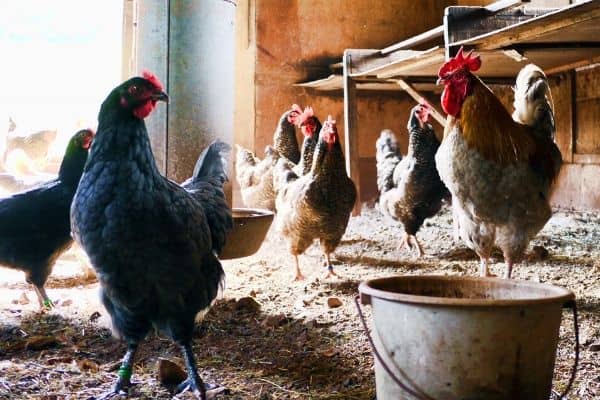
They See or Smell Blood
Now, chickens aren’t some crazy zombie-like creatures that are out for blood. Instead, chickens have a natural instinct to get rid of the weakest links in their flock- and one sign of being weak is bleeding.
Blood can occur for many reasons, from a bad fight during the pecking order to an illness or simply a scratch. But regardless of how the blood came about, the chickens are likely to attack the bloody chicken to get her out of the pack.
The Solution: Check on your chickens regularly and look for any signs of blood. Any unhealthy chicken should be quarantined from the pack until she is better. A bloodied chicken, on the other hand, should be given a thorough bath to get rid of the blood and the smell.
Conclusion
Chickens attack each other initially to establish a pecking order, but this is a shot-lived fight. Bullying, on the other hand, is a prolonged attack due to other reasons. The most common reason for attacks is overcrowding and being bored, so it’s important to make sure that the chickens are in a safe and comfortable environment. Also, make sure the chickens are in good health and remove eggs and change out water daily.
Related Posts
Corey and Maria have been raising laying hens on the Country Family Homestead for years and have dealt with hens establishing pecking order, bullying each other, being sick or injured, and dealing with predators.




